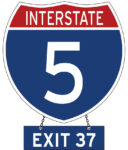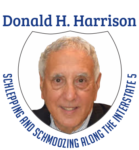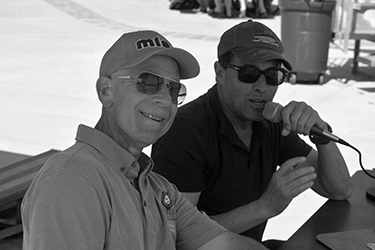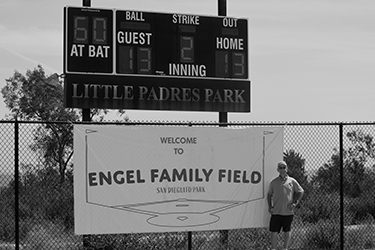 Editor’s Note: This is the 5th chapter in Volume 3 of Editor Emeritus Donald H. Harrison’s 2022 trilogy, “Schlepping and Schmoozing Along the Interstate 5.” All three books as well as others written by Harrison may be purchased from Amazon.com.
Editor’s Note: This is the 5th chapter in Volume 3 of Editor Emeritus Donald H. Harrison’s 2022 trilogy, “Schlepping and Schmoozing Along the Interstate 5.” All three books as well as others written by Harrison may be purchased from Amazon.com.
Schlepping and Schmoozing Along the Interstate 5, Volume 3, Exit 37 (Lomas Santa Fe Drive): San Dieguito County Park
From northbound Interstate 5, take the Lomas Santa Fe exit, turn right onto Lomas Santa Fe Drive and then turn left onto Highland Drive. The destination will be on the right. While the entrance is off Highland Drive, the park’s official address is 1628 Lomas Santa Fe, Del Mar. Drive to the end of first parking lot, where you will find stairs to the Engel Family Field.

 DEL MAR, California – Dan Engel calls a rubberized baseball field in San Dieguito County Park “my shul.” After seeing an HBO feature with Bryant Gumbel and Frank Deford about the “Miracle League” that was started in 1999 in Conyers, Georgia, Engel and his first wife, Suzie, considered starting a similar league for children with disabilities in San Diego County.
DEL MAR, California – Dan Engel calls a rubberized baseball field in San Dieguito County Park “my shul.” After seeing an HBO feature with Bryant Gumbel and Frank Deford about the “Miracle League” that was started in 1999 in Conyers, Georgia, Engel and his first wife, Suzie, considered starting a similar league for children with disabilities in San Diego County.
“At the time I was kind of beginning my journey through stage-four melanoma and it gave me a lot of purpose to work on Miracle League when I was battling for my life,” Engel recalled. “It took us two years from when we formed the nonprofit to when we opened our field in 2007. During that time, I had my first clean scan in two years, and it came a week before the field opened. That is why it is such a spiritual place for me.”
In addition to the flat, rubberized field that accommodates wheelchairs, walkers, crutches and other assistive devices, the Miracle League utilizes “the Big Jack Bat and Ball, developed by a Jewish guy in Rancho Santa Fe, Mark Rappaport of Marky Sparky Toys (of Escondido).”
Engel, who gets a kick out of being nicknamed the league’s “commissioner,” said the ball “is the exact dimensions of a regular hard ball, but it is soft and designed to pop off the plastic bat.” The Big Jack bat “looks like a two-liter bottle at the end of a handle, and it swings just like a bat. That is the only equipment we use. A lot of kids don’t have gloves. It is not like real baseball. You might find two runners on the same base at the same time. You will have runners passing another runner on the base path. You might have four kids in the outfield playing ‘dick, duck, goose.’ All that can happen in Miracle League.”
Scoring doesn’t matter in the Miracle League’s two-inning games in which every player per side gets to hit and circle the bases at least once per inning. At the end of the game, the score is always tied, and every player has had the thrill of crossing home plate at least twice to the cheers of their families, friends, and their game “buddies.”
The buddies share the field with the defense. “They provide encouragement,” Engel explained. “They help protect the player, if there is a big hitter at bat. They try not to let a ball hit a player on the fly.”
On offense, buddies “might help them hold the bat. They might just hold their hand. They might run next to them as they are running the bases. It is really support and encouragement as needed by the player. We have one buddy who has been a buddy for her younger brother for every season for 15 years now.”

Miracle League has important impacts on the players, their buddies, and on their parents, Engel told me during a March 2022 interview.
The players “feel like normal kids because they are playing baseball on a team, just like their siblings or their friends from school. They have something to look forward to on Saturdays. The smiles, the pure joy; it is unbelievable. Some players are more alert and aware than others, and some are more talkative than others – in fact, there are some who are nonverbal entirely—but you see their smiles, and you see them feeling like normal kids for an hour.”
The buddies “develop self-confidence and this sense of giving back; we are nurturing philanthropic souls,” Engel said. “I would say 98 percent of our kids who sign up as buddies come back week after week and season after season until they go off to college. I can tell you many have chosen to pursue careers in the special needs community, whether it is education or medical support, being a therapist. Many kids have chosen to work in this field because of their involvement in Miracle League and their love for their families. We have built a huge family community.” Engel’s daughter, Jordan, “was a buddy for 8 ½ years until she went off to college.”
Parents “get to sit in the stands and enjoy for an hour without having to be on call to watch every move that their children make,” Engel said.
It used to be that Miracle League teams wore Major Leage replica jerseys of the Padres, the Rays, Red Sox, Angels, Cardinals, Mets and others.
That was changed in the 2022 season. Each team—whether those playing at San Dieguito County Park or those playing at Bell Middle School in Chula Vista – was issued a different style of Padres uniforms. “There are 10 different styles, including camouflage uniforms (which the Padres wear on military Sundays); 1984 whites, road grays, home pin stripes, away pin stripes, home whites, road browns – it’s super fun,” Engel said.
With all the teams wearing Padres uniforms, each team is named after a famous Padre, past and present, including Tony Gwynn, Trevor Hoffman, Fernando Tatis Jr., Many Machado, Ozzie Smith, Dave Winfield, Stave Garvey, Jake Cronenworth, Trent Grisham, and Randy Jones.
The Padres’ current and former players occasionally show up during the off-season and take their turn at pitching underhand to the Miracle League batters. “We’ve had Joe Musgrove, Mark Loretta, Brad Ausmus, Mark Kotsay, Buddy Black, Tony Gwynn Jr., Mark Sweeney, Mark Grant, and Dave Roberts,” Engel said. Even professional footballers get into the act. They have included Junior Seau and Philip Rivers.
Some of the Miracle League players can play competitively, so a separate division was established for them. “They play by the rules and play the last game of the day,” Engel said. “They don’t have buddies who help them on the field. They just play the game. You could have as few batters as three if they make three outs, or they can bat around. They even have kids who hit the ball over the fence. I witnessed a home run over the fence recently by a kid who goes by the nickname Nashville. It went over the 200-foot fence. It was not the first one, but the most recent.”
At a celebrity game at which Joe Musgrove was pitching, one player drilled the ball over a fence not once, but twice. Then, while Musgrove was being interviewed by a television reporter, the young batter came up to him and asked him to autograph one of the home-run balls. Musgrove deadpanned on camera, “You’re embarrassing me on TV; you’re showing me up!”
As Miracle League sponsors, the Padres donate money, and “host us in the owner’s suite; they allow us to bring guests and donors; they provide tickets for our families for games; and they send out the Swinging Friar (Mascot) and the Pad Squad (rhymes with Mod Squad),” Engel said. “They are partners in every sense of the word.” Additional support is needed, with donations accepted via the league’s website.
Engel is often accompanied to the games by his wife Robin, who spent 20 years working with K-2 children with special needs at the Encinitas Union School District. “She knows a lot of the kids in the competitive division because she taught adaptive PE to them years ago.”
So, what does he as “the commissioner” do? I asked.
“Whatever needs to be done,” Engel responded. “I could be putting up umbrellas, setting up pop-up tents, or barbecuing hot dogs—they’re Hebrew Nationals by the way – at the snack bar. Or I could be modeling our new t-shirts or going around trying to sell them.”

It is remarkable that a league that has grown to some 300 players per season was co-founded by a man who didn’t know if he would survive cancer long enough to ever watch a game.
Engel told the story of the many clinical trials he participated in while fighting stage-four melanoma, which is a stage at which cancer that started on the skin had metastasized to other parts of the body. He wrote about his difficult journey in the memoir, Thriving Through Cancer.
“I have been through ten surgeries, radiation, gamma knife surgery on a brain tumor, and six clinical trials,” he summarized. “I am one of the first immunotherapy success stories in America and I have had more immunotherapy than almost anyone in the world. I am truly a miracle.”
His spiritual side emerges when he says, “I not so humbly believe that I am alive to change the world.” In addition to the Miracle League, “I was founding chairman of the board of the California Oncology Research Institute and co-founder of another non-profit, Pitch It Forward. I created PatientTrueTalk.com, a website that facilitates one-to-one communications between newly diagnosed cancer patients and those who’ve been there before. My book is part of that. But Miracle League was my first time in philanthropy from the standpoint of being involved on a daily basis with the people whose lives you are changing.”
“I grew up Orthodox,” Engel added. “Tzedakah was a part of who we are. I wrote checks from the first day I had a checkbook. I put money in the pushke (donation box or can) while going to the yeshiva, while growing up in Beverly Hills. I went to Hillel Hebrew Academy and went to Beth Jacob Congregation in Beverly Hills. Tzedakah is part of what we do. We need people to write checks, but it is very different from getting to know the people whose lives you are changing. It was a miracle that changed me forever.”
After graduating Beverly Hills High School in 1979, Engel received his bachelor’s degree from UCLA, then went on to UC Berkeley for an MBA and a law degree. “I started my career on Wall Street working for Salomon Brothers in the summer of 1985, and later worked for other firms. I had a pretty successful financial career.”
More important, according to Engel, “Miracle Legue is my shul; it gives me way more than I give back. We just decided to do something that turned out to be the greatest thing besides being a dad.”
In addition to Jordan, Engel has a son Sam, a stepson Mac, and a stepdaughter Frankie, “who gave us a grandson, Lucas, so I am a zaide (grandfather) now!”
*
Donald H. Harrison is editor emeritus of San Diego Jewish World. He may be contacted via donald.harrison@sdjewishworld.com